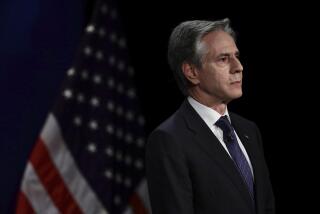Soviet Media Are Getting the Message : Frightening crackdown continues, but the West must avoid overreacting
- Share via
A Western world profoundly disheartened by the Soviet Union’s domestic swing to the right isn’t likely to care too much about just what internal considerations brought it about.
The European Community is threatening to cut off more than $500 million in technical aid to Moscow following the military crackdown in Lithuania. Some in Congress want to suspend what remains--about $200 million--of the $1 billion in agricultural credits that were granted to help get the Soviets through a hungry winter. The West’s moral outrage is understandable. The trouble is that ordinary people would suffer more from sanctions than would the Soviet regime. For that reason Washington and the Europeans must take great care to weigh all the potential consequences before reacting.
But President Mikhail Gorbachev isn’t making it easy for those outsiders who want to do what they can to encourage Soviet reforms. Angry at criticism from some publications over what happened in Lithuania, Gorbachev has called for a suspension of the Soviet Union’s recent law on press freedom. The Supreme Soviet instead says it will ready a measure to ensure “objectivity” in the media. Much of the media, though, already have the message. The Tass press agency and state-controlled television have resumed a near-slavish toeing of the official line, using what Western reporters say are outright lies to depict events in Lithuania. Bigger lies may be in prospect. The signs are that Moscow is preparing to move soon against the democratically elected and separatist-minded governments of Estonia and Latvia, thus bringing all of the Baltics once again under its control.
The political will to do so is there. So is the cover of legality. Gorbachev has emergency powers to impose direct presidential rule over troublesome republics. If he uses that power, he’ll be taking a giant step toward the dictatorship that former Foreign Minister Eduard Shevardnadze last month warned was coming.
Gorbachev, says a foreign diplomat in Moscow, “does not seem to appreciate that if you let Eastern Europe abandon (communism), you have to let Soviet republics do it, too.” In the Baltics and the other smaller republics, force may hold things together , at least for a while. But there is a basic and obvious incompatibility between crushing democratic opponents one day and calling for the adoption of progressive economic and political reforms the next. Gorbachev can have one or the other, but he cannot have both.
More to Read
Sign up for Essential California
The most important California stories and recommendations in your inbox every morning.
You may occasionally receive promotional content from the Los Angeles Times.













